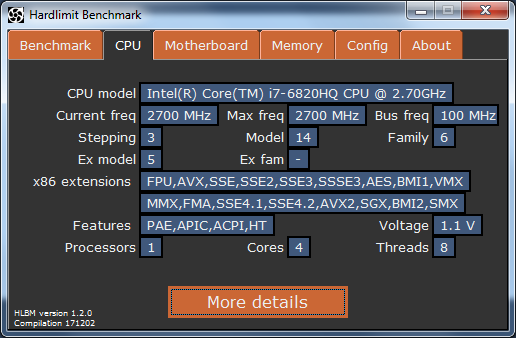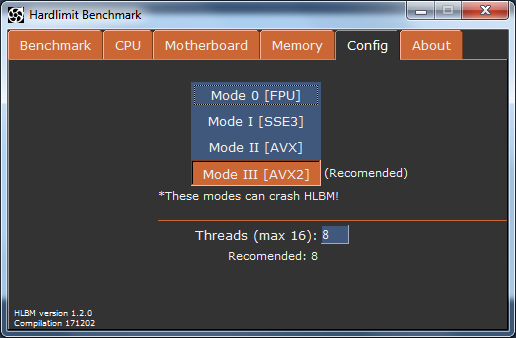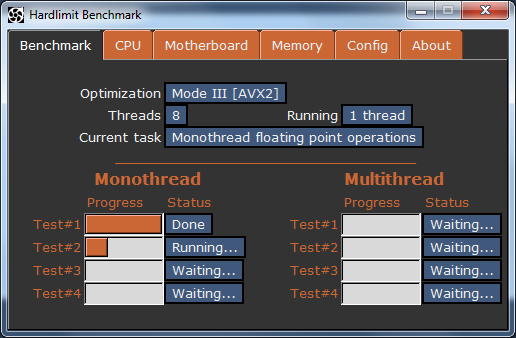[lang_hl=es,Español]Acerca del banco de pruebas Hardlimit[/lang_hl] [lang_hl=en,English]About Hardlimit benchmark[/lang_hl]
[lang_hl=es,Español]
En Hardlimit no mostramos publicidad ni rastreamos a nuestros usuarios. Los que hacemos esto, lo hacemos sencillamente porque nos gusta. Puedes ponerte en contacto con nosotros directamente a través de esta dirección de correo: .
.
[/lang_hl] [lang_hl=en,English]In Hardlimit we don't show ads nor we track our users. We do this just because we like it. If you have any question, suggestion or you want to report a bug, please contact us by email:
[/lang_hl][lang_hl=es,Español]
El banco de pruebas no envía ni recibe información por Internet durante su ejecución. El banco de pruebas envía datos de resultados y componentes de hardware a hardlimit.com de forma anónima cuando se realiza una validación. En estos datos se incluyen exclusivamente las puntuaciones obtenidas y la configuración de hardware. Esta información no permite la identificación unívoca de un usuario si este no se registra en el sistema de validación. De validar el resultado, tanto las puntuaciones de las pruebas como la configuración del hardware se harán publicas. Si el usuario se identifica durante la validación, dichos datos se asociarán al nombre de usuario en cuestión.
[/lang_hl] [lang_hl=en,English]
Hardlimit Benchmark doesn't send or receive any information thru Internet during its execution unless you validate the result. Hardlimit Benchmark will send tests scores and hardware devices information anonymously during validation time. This data will be public but it doesn't allow us to identify a single user since it is generic information (numeric data from results plus hardware brands, models and amount of memory). If you log in during validation time, the information sent will be linked to your user name.
[/lang_hl][lang_hl=es,Español]
HLBM es el banco de pruebas para procesadores de Hardlimit que permite ejecutar pruebas optimizadas para distintos sets de instrucciones así como la elección del número de hilos a ejecutar. Al programa le acompaña una base de datos de resultados: HLBM Central. Actualmente se muestra información detallada de varios componentes de nuestro hardware y han quedado definidos las pruebas por las que ha de pasar la CPU.

Una de las peculiaridades de este banco de pruebas es que es posible elegir el repertorio de instrucciones que se usa en su ejecución. Existen varios modos para aprovechar extensiones como SSE o AVX. Esto no solo permite saber de qué es capaz nuestro micro usando los últimos sets, sino que también permite saber cómo se comporta cuando ejecuta código que no está optimizado para sacar todo su potencial: no todos los programas están compilados para aprovechar AVX2, así que por mucho que dispongas de esa extensión, puede que no te sirva de nada.

Otra ventaja es la posibilidad de elegir el número de hilos a ejecutar. HLBM hará dos pruebas: una monohilo y otra multihilo. Es posible que quieras evaluar el rendimiento con una cantidad de hilos diferentes a la que es capaz de ejecutar tu procesador de forma concurrente. O también es posible que quieras saber cuánto mejora HyperThreading o SMT el rendimiento con respecto a usar tan solo los núcleos físicos de tu procesador.

[/lang_hl] [lang_hl=en,English]
HLBM is a CPU benchmark intended to measure the performance of a CPU in multiple areas.

You can choose the x86 instruction set extension such as SSE or AVX to test how good are them for some operations. Furthermore, you can test how fast is your proccessor by executing old instructions sets. Rebember: not all sofware is compiled for AVX2.

Also you can set the number of threads to execute. By default, HLBM will execute the maximum number of threads for your CPU but maybe you want to try a lower amount of threads to check how HyperThreading or SMT is doing. HBLM runs four tests:
·Test#1 and #2: will evaluate the performance in the execution of SIMD entire and floating point operations. These tests will improve dramaticaly its results by setting a higher mode. The result will show you how fast is your CPU for multimedia and games.
·Test#3: This is a generic program. We have chosen a zip de/compression routine. The result will be barely affected by the mode. This test will show you how fast is you CPU for generic operations like the operating system itselft and non-multimedia software.
·Test#4: This test runs a memory performance benchmark. The result depends on memory speed and cache size, its management and availavility. The higher results means a faster memory.

[/lang_hl]
En Hardlimit no mostramos publicidad ni rastreamos a nuestros usuarios. Los que hacemos esto, lo hacemos sencillamente porque nos gusta. Puedes ponerte en contacto con nosotros directamente a través de esta dirección de correo:
 .
.
[/lang_hl] [lang_hl=en,English]In Hardlimit we don't show ads nor we track our users. We do this just because we like it. If you have any question, suggestion or you want to report a bug, please contact us by email:

[/lang_hl][lang_hl=es,Español]
Política de privacidad
El banco de pruebas no envía ni recibe información por Internet durante su ejecución. El banco de pruebas envía datos de resultados y componentes de hardware a hardlimit.com de forma anónima cuando se realiza una validación. En estos datos se incluyen exclusivamente las puntuaciones obtenidas y la configuración de hardware. Esta información no permite la identificación unívoca de un usuario si este no se registra en el sistema de validación. De validar el resultado, tanto las puntuaciones de las pruebas como la configuración del hardware se harán publicas. Si el usuario se identifica durante la validación, dichos datos se asociarán al nombre de usuario en cuestión.
[/lang_hl] [lang_hl=en,English]
Privacy policy
Hardlimit Benchmark doesn't send or receive any information thru Internet during its execution unless you validate the result. Hardlimit Benchmark will send tests scores and hardware devices information anonymously during validation time. This data will be public but it doesn't allow us to identify a single user since it is generic information (numeric data from results plus hardware brands, models and amount of memory). If you log in during validation time, the information sent will be linked to your user name.
[/lang_hl][lang_hl=es,Español]
Acerca del banco de pruebas Hardlimit
HLBM es el banco de pruebas para procesadores de Hardlimit que permite ejecutar pruebas optimizadas para distintos sets de instrucciones así como la elección del número de hilos a ejecutar. Al programa le acompaña una base de datos de resultados: HLBM Central. Actualmente se muestra información detallada de varios componentes de nuestro hardware y han quedado definidos las pruebas por las que ha de pasar la CPU.

Una de las peculiaridades de este banco de pruebas es que es posible elegir el repertorio de instrucciones que se usa en su ejecución. Existen varios modos para aprovechar extensiones como SSE o AVX. Esto no solo permite saber de qué es capaz nuestro micro usando los últimos sets, sino que también permite saber cómo se comporta cuando ejecuta código que no está optimizado para sacar todo su potencial: no todos los programas están compilados para aprovechar AVX2, así que por mucho que dispongas de esa extensión, puede que no te sirva de nada.

Otra ventaja es la posibilidad de elegir el número de hilos a ejecutar. HLBM hará dos pruebas: una monohilo y otra multihilo. Es posible que quieras evaluar el rendimiento con una cantidad de hilos diferentes a la que es capaz de ejecutar tu procesador de forma concurrente. O también es posible que quieras saber cuánto mejora HyperThreading o SMT el rendimiento con respecto a usar tan solo los núcleos físicos de tu procesador.

Test #1 y #2
Los dos primeros test evalúan el rendimiento en el cálculo de números enteros y de coma flotante respectivamente, que son las principales operaciones que se llevan a cabo en juegos y programas multimedia. Estos test ejecutan código optimizado para SIMD, por lo que cuanto más elevado sea el modo de ejecución, mejores serán tus resultados.Test #3
Consiste en el rendimiento de una tarea genérica. Para este test se ha elegido la compresión y descompresión en zip. Esta prueba mejora ligeramente su resultado en función del modo aunque la mejoría está muy por debajo de la obtenida en los dos primeros tests. Con este resultado te puedes hacer una idea del rendimiento de tu procesador con programas genéricos, servicios y sistemas operativos.Test #4
Evalúa el rendimiento de la memoria RAM. Aquí hay varios factores a tener en cuenta: velocidad de la memoria, cantidad de caché y programas en ejecución. Evidentemente, cuanto más rápida sea tu memoria, mejor será el resultado. Pero la velocidad de acceso a la memoria está fuertemente condicionada por la cantidad de memoria caché, su gestión y su uso.HLBM Central
El banco de pruebas va de la mano de la Central que como su nombre indica, centraliza las validaciones realizadas por los usuarios. Pero, ¿qué es una validación? Una vez que has pasado el bando de pruebas, tienes la posibilidad de compartir tu resultado de una forma cómoda y fiable. Puedes, o bien hacer la validación de forma anónima o usando tus credenciales del foro. Una vez realizada, podrás compartir la dirección web de tu resultado (como por ejemplo esta) como comprobante del mismo. En los detalles de cada resultado aparece información valiosa, no solo para evaluar el rendimiento, sino para conocer las condiciones bajo las que se llevaron a cabo los tests. Junto al resultado aparecen gráficas de rendimiento con respecto al tiempo, representando una puntuación por cada segundo de ejecución. Cada test se ejecuta durante 10 segundos. Con esta información no solo podremos saber si en algún momento algún proceso en segundo plano ha acaparado tiempo de ejecución del procesador sino que se podrán evaluar problemas físicos como un aumento de la temperatura superior al normal por una mala ventilación. Esta situación podría activar los mecanismos de protección de la CPU, disminuyendo su frecuencia de funcionamiento y por lo tanto, su rendimiento. En la portada de la central aparecen varios rankings. Si eliges validar con tus credenciales y tus resultados son lo suficientemente buenos, puedes acabar en el Top 10.Firmas Hardlimit
Cuando envíes un resultado usando tu nombre de usuario, se generará una firma en la que aparecerá tu nick, tus resultados y el modelo de tu procesador en dos estilos visuales. Podrás usar esta imagen como firma en cualquier lugar. Las firmas también son útiles para compartir resultados sin la necesidad de copiar y pegar texto ya que en tu resultado aparecerá un enlace a la imagen que podrás copiar y pegar.[/lang_hl] [lang_hl=en,English]
About Hardlimit Benchmark
HLBM is a CPU benchmark intended to measure the performance of a CPU in multiple areas.

You can choose the x86 instruction set extension such as SSE or AVX to test how good are them for some operations. Furthermore, you can test how fast is your proccessor by executing old instructions sets. Rebember: not all sofware is compiled for AVX2.

Also you can set the number of threads to execute. By default, HLBM will execute the maximum number of threads for your CPU but maybe you want to try a lower amount of threads to check how HyperThreading or SMT is doing. HBLM runs four tests:
·Test#1 and #2: will evaluate the performance in the execution of SIMD entire and floating point operations. These tests will improve dramaticaly its results by setting a higher mode. The result will show you how fast is your CPU for multimedia and games.
·Test#3: This is a generic program. We have chosen a zip de/compression routine. The result will be barely affected by the mode. This test will show you how fast is you CPU for generic operations like the operating system itselft and non-multimedia software.
·Test#4: This test runs a memory performance benchmark. The result depends on memory speed and cache size, its management and availavility. The higher results means a faster memory.

[/lang_hl]
Hardlimit Benchmark Central - Ver. 4.3.1

